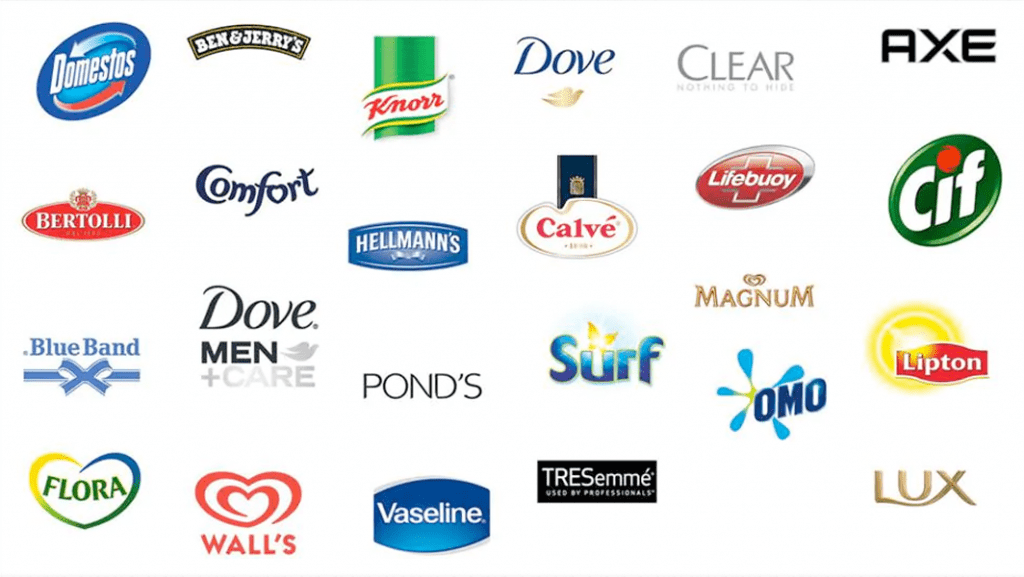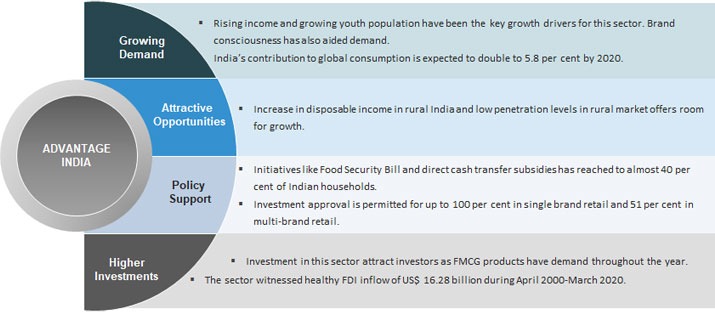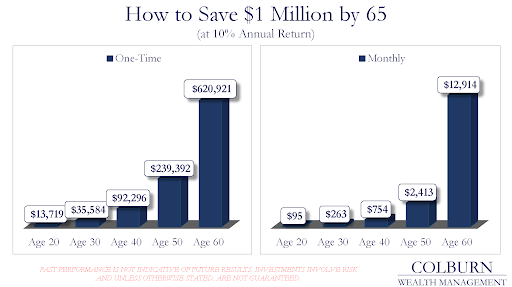FMCG is the fourth largest sector in the Indian economy.
Introduction & Snapshots
Fast-moving consumer goods (FMCG) sector is India’s fourth largest sector with household and personal care accounting for 50 per cent of FMCG sales in India. Growing awareness, easier access and changing lifestyles have been the key growth drivers for the sector. The urban segment (accounts for a revenue share of around 55 per cent) is the largest contributor to the overall revenue generated by the FMCG sector in India. However, in the last few years, the FMCG market has grown at a faster pace in rural India compared to urban India. Semi-urban and rural segments are growing at a rapid pace and FMCG products account for 50 per cent of the total rural spending.

Market Scenerio & Scope:
The retail market is estimated to reach US$ 1.1 trillion by 2020 from US$ 840 billion in 2017, with modern trade expected to grow at 20-25 per cent per annum, which is likely to boost revenue of FMCG companies. Revenue of FMCG sector reached Rs 3.4 lakh crore (US$ 52.75 billion) in FY18 and is estimated to reach US$ 103.7 billion in 2020. FMCG market is expected to grow at 9-10 per cent in 2020.
Some of the major initiatives taken by the Government to promote the FMCG sector in India are as follows:
- The Government of India has approved 100 per cent FDI in the cash and carry segment and in single-brand retail along with 51 per cent FDI in multi-brand retail.
- The Government has drafted a new Consumer Protection Bill with special emphasis on setting up an extensive mechanism to ensure simple, speedy, accessible, affordable and timely delivery of justice to consumers.
- The Goods and Services Tax (GST) is beneficial for the FMCG industry as many of the FMCG products such as soap, toothpaste and hair oil now come under the 18 per cent tax bracket against the previous rate of 23-24 per cent. Also, GST on food products and hygiene products have been reduced to 0-5 per cent and 12-18 per cent respectively.
- GST is expected to transformlogistics in the FMCG sector into a modern and efficient model as all major corporations are remodelling their operations into larger logistics and warehousing.
- Investment Opportunities :
- Mother Dairy enters bread segment aims Rs. 25000 Crores turn over in next 5 yrs.
- ITC completes acquisition of spice –maker Sunrise in Rs.2150Cr-all –cash deal.
- Britania Plans Rs.700 Crore capex,bullish on rural demand.
- Indian online grocery market can exceed US$ 3bn sales in 2020.
Nutrition brand Oziva raises US$5million from Matrix partners India.

- FMCG companies are looking to invest in energy efficient plants to benefit the society and lower cost in the long term. Dabur had plans to invest Rs 250-300 crore (US$ 38.79-46.55 million) in FY19 for capacity expansion and possible acquisitions in the domestic market. The sector witnessed healthy FDI inflow of US$ 16.28 billion during April 2000-March 2020. Investment intentions related to FMCG sector arising from paper pulp, sugar, fermentation, food processing, vegetable oils and vanaspati, soaps, cosmetics, and toiletries industries worth Rs 19,846 crore (US$ 2.84 billion) was implemented until December 2019.
- Growing awareness, easier access, and changing lifestyle are the key growth drivers for the consumer market. The focus on agriculture, MSMEs, education, healthcare, infrastructure and tax rebate under Union Budget 2019-20 was expected to directly impact the FMCG sector. Initiatives undertaken to increase the disposable income in the hands of common man, especially from rural areas, will be beneficial for the sector.
SCOPE- INVEST INDIA – “WMN” VITAL ROLE IN TERMS OF FDI
”WMN” is playing an important role in all the categories and sectors,
“ WORLD MEDIA NETWORK” is venturing into a Press Release distribution company covering over 180 countries and more than twenty-five languages across the world. Covering Digital News, Television, Print, Radio, Billboards, Airports, Multiplexes,Talk shows .
Press releases are based on Industry standards and timely Coverages help in business development and scope of growth among the countries and FDI’s “WMN” is helping upcoming n existing businesses to grow within the perpetual business as the government is working towards domestic and international Tie-Ups .
Most service-oriented industries need to be promoted through WMN with direct and indirect participation and looking for opportunities for Franchising modules in the world.
“WMN” LEAD GENERATION
There are two types of lead within the lead generation market: sales leads and marketing leads. A Sales lead is generated on the basis of demographic criteria such as FICO score (United States), income, age, home Income, psychographic, etc. These leads are resold to multiple advertisers. Lead generation describes the marketing method of stimulating and capturing interest in a very product or service for the purpose of developing a sales pipeline. Lead generation typically uses digital channels and has been undergoing substantial changes in recent years from the increase of the latest online and social techniques.
MINISTRIES OF THE GOVT.OF INIDA “WORLD MEDIA NETWORK” ASSISTANCE
“ WMN’’ will guide the corporates/ company/ individuals in establishing the business in India depending on the states to get the required permissions from the Ministries of The Government of India.
The Ministries include
Ministry of Health
Ministry of Railways
Ministry of Power
Ministry of Electronics & Information & Technology
Ministry of Communication
Ministry of Tourism & Transport
Ministry of Civil Aviation
Ministry of Petroleum & Natural Gas
Ministry of Chemicals & Fertilizers.
Ministry of Commerce & Industry
Ministry of Ayush
Ministry of Agriculture & Farmers
Ministry of Department of North East region
Ministry of Earth Sciences
Ministry of Environment, Climate change & Forest
Ministry of External affairs &Finance
Ministry of Fisheries, Animal Husbandry, Dairying
Ministry of Heavy Industries& Public Enterprises
Ministry of Home Affairs, Housing &Urban Affairs.
Ministry of Human Resources Development
Ministry of Information &B broadcasting
Ministry of Jal Shakti
Ministry of Law &Justice
Ministry of Labour &Employment
Ministry of MSME’s
Ministry of Mines
Ministry of minority affairs
Ministry of New & Renewable Energy
Ministry of Panchayat Raj
Ministry of Parliamentary Affairs
Ministry of Personnel, Public Grievances & Pension
Ministry of Science & Technology
Ministry of Rural Development
Ministry of Road Transport & Highways
Ministry of Shipping
Ministry of Skill Development & Entrepreneurship.
Ministry of Social Justice & Empowerment
Ministry of Steel, Textiles, Tribal affairs.
Ministry of Women & Child Development
Ministry of Youth Affairs & Sports
Ministry of Statistics & Programme Implementation.
RURAL MARKET IN INDIA& INVEST IN INDIA

“WMN”STRATEGY
Importance of brand visibility in Rural Markets of India for high brand Recall & Pull. It’s easy to ignore other languages if one the dominant language makes up the majority. While English does make for the majority, there is a section that only consumes content in a regional language and this section could be your most important target audience. To be present Indic content we also encouraging websites to enagage consumers in multiple languages.
”WMN”is going to support in many ways through various resources. In Moral, Development of any country not only depends on the continuous development of the urban areas but also relies on the development of the small towns and rural areas. Government, as well as individual actions together, contribute towards the success of any country as a whole. The Major industries in Rural market segments are mainly covered with as….
1)FARMING
2) ORGANIC FARMING.
3)LIVESTOCK FARMING
4)FISH FARMING
5)FIVE STORES IDEAS ie SEEDS & FERTILIZERS STORE,GROCERY STORES,ICECREAM & SWEET STORES,CLOTHING & CHEMISTS STORES.etc.
6) DAIRY FARM BUSINESS
7)POULTRY,SMALL SCALE UNITS MANUFACTURING UNITS & CONSTRUCTIONS.
8)LOW BUDGET VILLAGE BUSINESSES etc.

